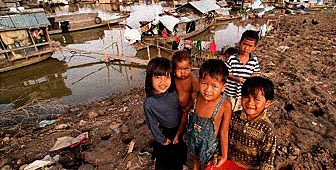Aid agencies step up pressure ahead of poverty summit

As the United Nations member governments gear up for a world poverty summit at the end of June, Swiss development agencies are lobbying the government to change its approach to tackling poverty.
Five years after the UN social summit in Copenhagen, member governments are to meet in Geneva later this month to consider how close they have come to meeting that summit’s goals of reducing poverty and increasing employment and social equality.
The statistics are not encouraging. Even the most vociferous advocates of free trade and open markets admit that, in the past five years, the gap between rich and poor has continued to grow at a faster rate than ever before. Today, nearly one and a half billion people are forced to get by on less than one dollar a day.
At the same time, a small number of people – especially company directors – have seen their incomes soar to unprecedented levels. Corporate wealth has also rocketed, with several of the world’s leading companies now worth more than the gross domestic product of many medium-sized economies. America’s Wal Mart, for instance, has assets greater than the GDP of Poland or South Africa.
The Swiss Coalition of Development Agencies says these vast and growing extremes between rich and poor prove that a new approach is needed to tackle poverty. They want Switzerland to take up the cudgels on behalf of poorer countries.
Peter Niggli is executive director of the Swiss Coalition. His job is to lobby the Swiss government on development issues. He says it’s clear that promoting wealth by stimulating economic growth is not the way forward.
“We must fight poverty, and this will not be done by promoting wealth. Money is around anyway, and growth is happening anyway. So the question is how are jobs coming to the poor, and how is money coming to the poor? We should not just be praying for economies to grow, grow, grow…”
In most rich countries, it is almost an article of faith that growth will bring down poverty. However, aid agencies and other non-governmental organisations view this assumption with increasing scepticism. They say the key is wealth distribution, and that economic policy needs to be closely tied to a progressive social development policy.
The United States is fiercely opposed to any move that interferes with the free market economy. But according to Niggli, Switzerland’s position is rather more ambiguous. “The Swiss are softer, they want a compromise. However, the leader of the Swiss delegation is attached to the economics ministry, and naturally they more or less think like the Americans. But they don’t say so. They would somehow like to reconcile the prevailing economic policies with a little bit more social heart. But that’s not enough.”
His words are echoed by Charles Abugre, director of the Integrated Social Development Centre in Ghana. “There’s a lot more awareness of social policy, and of the need for gender equality,” he says. “But very little has changed in the nature of Africa’s trading relations. It has difficulty accessing markets for its products, there’s a lot of capital being held abroad, and there’s the great need for debt to be cancelled rather than simply reduced.”
Beyond sub-Saharan Africa, where growth has been negative since 1973, the majority of people in Latin America and Asia are also stricken by poverty despite wide differences in their stages of development. Growth in Latin America has been below two per cent for the past decade, while the 1997 economic crisis in south east Asia has forced millions back into the poverty they so recently escaped.
The Swiss Coalition of Development Agencies, along with other NGOs, is hoping the Geneva summit will take concrete action to reduce the massive third world debt. They also want the conference to take action to stem international capital flows, which wreaked such havoc on developing economies after the recent economic crisis in Asia.
They are lobbying hard for the introduction of a special tax on foreign exchange transactions. This tax – known as the Tobin tax after the man who first proposed it – would levy a 0.5 per cent charge on short-term transactions with the aim of reducing speculation on the foreign exchange markets.
The NGOs don’t expect the Tobin tax to be introduced any time soon. But with growing international recognition about the devastating effect that speculative flows of wealth can have on fragile economies, they are hoping that continued lobbying for the tax may eventually pressure rich governments into action.
by Juliet Linley

In compliance with the JTI standards
More: SWI swissinfo.ch certified by the Journalism Trust Initiative
You can find an overview of ongoing debates with our journalists here. Please join us!
If you want to start a conversation about a topic raised in this article or want to report factual errors, email us at english@swissinfo.ch.